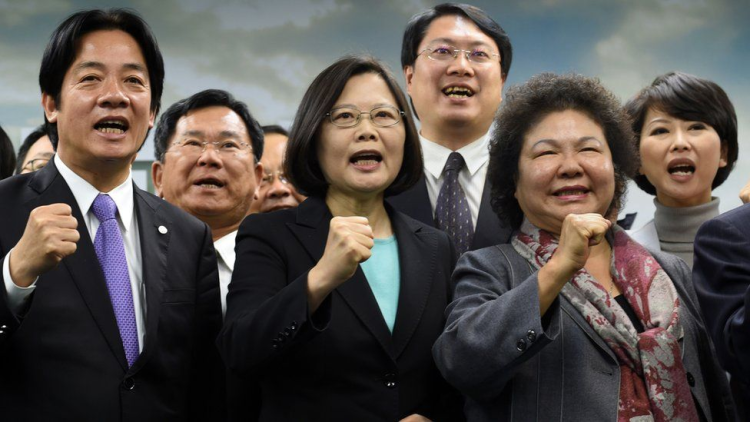
Soft Focus, Hard Powers: The Circulations and Sublimations of Taiwanese Audiovisual Arts in Latin America

Key information
- Date
- Time
-
3:00 pm to 4:30 pm
- Venue
- Brunei Gallery, SOAS, University of London
- Room
- BGLT
- Event type
- Event highlights
About this event
Throughout the last decade, Taiwanese audiovisual arts have made unprecedented appearances in Latin America. This striking reality has arisen at the same time as the decline of formal diplomatic recognition of Taiwan in the region.
Has the dissipation of Taiwanese hard power in the Americas therefore been compensated by a new kind of cultural power? Has the ascent of the arts somehow altered the descent of the ambassadors? If not, what other kinds of understandings and implications might emerge when considering that soap operas, films and performance art now stand as the primary markers of Taiwan and Taiwanese identity throughout the Spanish-speaking world?
The first and foremost part of this talk will consider the circulation throughout Latin America of Taiwanese soap operas dubbed into Spanish. This phenomenon, which launched in 2015, was an explicitly diplomatic maneuver driven by the Taiwanese government. A pop culture sublimation of state interests, it marked the first time that Taiwan had tried to cultivate favor among mass publics in Latin America, the one geopolitical region of the world where Taiwan had been able to maintain some degree of formal diplomatic recognition despite the pressures of China. The initial soap opera sent out to win hearts and tears was 犀利人妻, known as The Fierce Wife in English and La esposa valiente [The Valiant Wife] in Spanish.
The premise of this show echoed, perhaps inadvertently, the premise of Taiwanese relationships with its Latin American allies: a longstanding marriage was in danger of betrayal by a third party, a relative at that. Infidelity is the fundamental plot twist of all soap operas, and that is exactly what Taiwanese diplomacy had battled against for decades as one partner after another had betrayed its pledge of allegiance. The circulation of 犀利人妻 was then followed into the Americas by three other Taiwanese soap operas, all dubbed into Spanish and all released in various Latin American capitals with creative marketing orchestrated by Taiwanese diplomatic missions. The official fanfare for the soap opera debuts included staged public announcements and trivia contests and prizes for local fans of the Taiwanese shows.
After analyzing this unique arrival of Taiwanese audiovisual arts in Latin American cultural spaces, the talk will turn to the appearance in the same moment of Taiwanese culture of markedly more local origins: the filmic work of Taiwanese-Argentine director and screenwriter Juan Martín Hsu. Hsu, born and raised in Argentina to Taiwanese parents, has released to date a multilingual feature film, La Salada, that includes a lonely Taiwanese immigrant in Buenos Aires as one of its major characters; a meticulously crafted short, Diamante Mandarín, that may be the only Chinese-language film to have originated from Argentina; and a family documentary, La luna representa mi corazón, that takes place entirely in Taiwan and takes its title from a Teresa Teng song. Although the aims and receptions of Hsu’s art-house oeuvre appear to be rather different than those of a pop culture product such as 犀利人妻, the two share a single stage as major enactors of Taiwanese cultures in Latin America over the last decade.
The talk will conclude by briefly looking at the Central American and South American tours of Tsai Ing-wen, a performance artist who moonlights as the President of Taiwan. How might the audiovisual stagings and seemingly happy audiences for Tsai dovetail or not with the circulations and sublimations of Taiwanese arts in the soap operas and films abovementioned?
Speaker's Biography
Prof. Adam Lifshey
Dr. Adam Lifshey is Professor at Georgetown University (Washington, DC) in the Department of Spanish and Portuguese. His book The Magellan Fallacy: Globalization and the Emergence of Asian and African Literature in Spanish, won a global competition (the A-Asia/ICAS Africa-Asia Book Prize) for the best book published between 2009 and 2015 in English, French or Portuguese on any topic linking Africa and Asia. His other books include Subversions of the American Century: Filipino Literature in Spanish and the Transpacific Transformation of the United States and Specters of Conquest: Indigenous Absence in Transatlantic Literatures.
Within Taiwan Studies, Dr. Lifshey has published the essays “On the Third Hand: Why to taiwan World Literature” in the National Taiwan University journal Ex-position (PDF, 288KB) and “Translating Taiwan Southward” in Positioning Taiwan in a Global Context: Being and Becoming, a volume edited by Bi-yu Chang and Pei-yin Lin. His academic degrees include a B.A. in United States History and Literature from Harvard University, a Ph.D. in Hispanic Languages and Literatures from the University of California, Berkeley, and an M.A. in Taiwan Studies from SOAS (University of London).
About 2023 SOAS Taiwan Studies Summer School
The Centre of Taiwan Studies (CTS) at the SOAS, University of London is excited to present a 2.5-day Summer School programme filled with engaging talks, seminars, and roundtables, taking place right after the EATS annual conference from the afternoon of June 28th to June 30th, 2023.
In our commitment to promoting the study of Taiwan, we are pleased to offer free and open-to-public attendance for the Summer School. We highly encourage individuals from all walks of life who are interested in Taiwanese culture and Taiwan studies attend our course.



